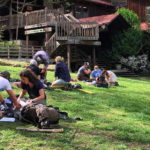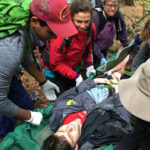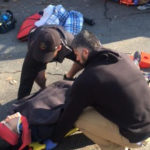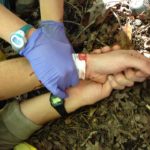A 5-Day Bridge Course From the Street to the Outdoors
The Wilderness Module is for medical professionals who want to learn how to provide high quality patient care in remote locations and challenging situations. How can we apply our skills and knowledge without access to the tools and resources we are used to in the front country? We address the challenges posed by rough terrain, limited resources, inclement weather, difficult patient access, and prolonged evacuation. This course emphasizes improvisation, critical thinking, and communication. We encourage EMT’s, paramedics, nurses, PA’s, doctors, and other medical providers to take this 5-day course.
Looking for the full WEMT course? Click here.
Wilderness Module: 40 Hours/5 Days
This module focuses on patient access, assessment, care, and evacuation in remote environments. Students learn how to provide high quality care with limited resources and without access to an ambulance. The course builds on students’ existing medical training and expands their tool kits. Wilderness topics include search and rescue, improvisation, survival skills, rope rescue techniques, and communication. Current EMT license holders qualify as WEMT’s at the conclusion of the course. Other providers earn the Wilderness First Responder (WFR) certification.
This course does not include CPR.
Lodging: Available through NOC
Meals: Available through NOC’s Restaurants
Recommended For: First Responders, Doctors, Nurses, PAs, EMTs, Paramedics
Upon Succesful Completion:
- 2-year Wilderness Emergency Medical Technician certification (for current EMT's AEMT's, & Paramedics) OR 3-year Wilderness First Responder certification (all other current medical practitioners)
- 40 hours Continuing Education credit*
For Financial Aid Resources and documents, click here.
*Successful completion of the course requires 100% attendance, passing grades on all tests and assessments, and completion of all written work. It is the student’s responsibility to confirm eligibility for Continuing Education Units with their governing body.
Courses Dates
| Course | Dates | Location | Tuition | |
|---|---|---|---|---|
| Wilderness Module for Healthcare Professionals | Oct 9th - 13th, 2024 | Bryson City, NC | $800 |
Course Outline
Course Topics
Barotrauma and Marine Bites & Stings
Case Histories and Mock Rescues
Dehydration
Frostbite
Heat Exhaustion
Heat Stroke
Hypothermia
Musculoskeletal Injuries
North American Bites & Stings
Principles of Long-Term Patient Care
Severe Weather, Lightning & Avalanche
Soft Tissue Injuries
Wilderness Patient Assessment System
Course Objectives
Bridge emergency personnel to Wilderness First Responder or Wilderness EMT status
Course Notes:
This 5-day program focuses on emergency care protocols when separated from definitive care by distance, time, or circumstance.
Packing List
Print the course packing list by clicking on the print icon to the right.
You should plan to have clothing appropriate to the season in which you will be taking the class, as you will spend a significant amount of time outside. The following list is to SUPPLEMENT the clothing you will be wearing. If you have trouble locating some of these items please call us as we have a limited amount for loan.
Necessary items (for all classes)
- Backpack to put everything in (medium to large)
- Rain gear (tops and bottoms)
- Layers of clothing (for splinting exercises and to keep yourself warm during scenarios)
- Warm hat or sun hat
- Water bottles (at least 1 qt/litre)
- Some snacks
- Pen and notepad
- Wrist Watch (cell phone is not sufficient)
- Foot wear appropriate to the terrain (closed toes, no flip flops)
- Insect repellent
- Sunscreen
Additional items
(Optional for WFA, Required for AWFA, WFR, WEMT, WEMT Module)
- Old Sleeping bag or blanket
- Footwear you don't mind getting wet
- Knife
- Plastic tarp or groundsheet (min 6’X6’)
- Head light
- Sleeping pad (ensolite or thermarest)
- Personal first aid kit (Band-Aids etc)
- Trekking poles (useful but not required)





